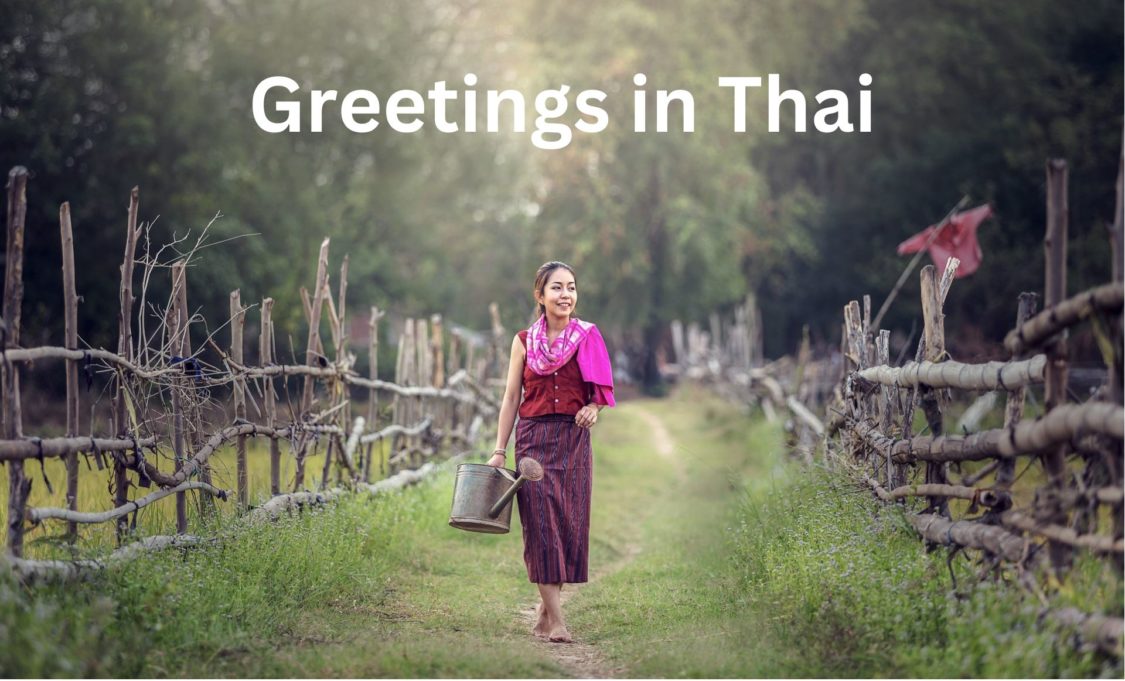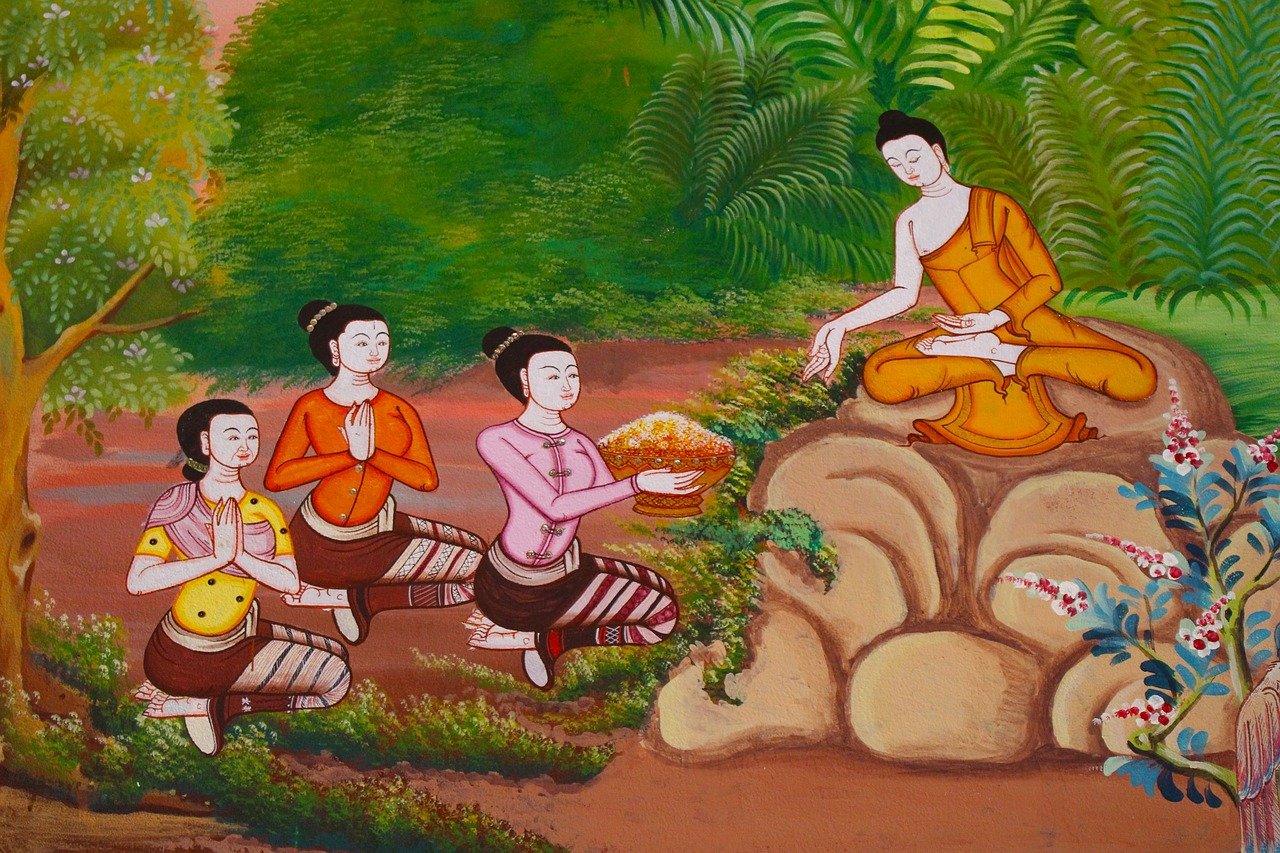Greetings in Thai

The two most common Thai greetings are: “Sà-wàt dee khráp/khá” (สวัสดีครับ/ค่ะ), which is the equivalent of “Hello” or “Good Morning/Afternoon,” and “Sà-bai dee măi?” (สบายดีไหม), which means “How are you?”. Both greetings are accompanied by the polite “Wai” gesture.
How to Say Hello in Thailand
When using the Thai greeting “Sà-wàt dee khráp/khá” there is no need to add the person’s name before or after the greeting. When a person’s name is added, it is usually added at the end. Just be sure to add the person’s honorific before their name. For most people this would be the Thai word “Khun” (คุณ). However, when addressing a university teacher, it is “Ajarn” (อาจารย์), and when talking to a schoolteacher it is “Khru” (ครู).
A man saying hello to a Thai co-worker named Suwat might say “Sà-wàt dee khráp, khun Suwat!” while a woman would say Sà-wàt dee khá, khun Suwat!” — as men add the polite word “khráp” to the end of Thai greetings, and women the female equivalent “khá”. This greeting should be spoken while offering a polite “wai”, which is a gesture made by pressing the palms of your hands together in front of your chest, as if in prayer. In India, this gesture is known as the “namaste“.
Thailand places a great emphasis on happiness. Indeed to be happy despite adverse circumstances is considered a high virtue. People in the Land of Smiles are also expected to be aware of, and concerned about, the happiness of others. So, it should come as no surprise that the literal word by word translation of “Sà-wàt dee” is: happiness good. When delivering this Thai greeting, you are expressing happiness at seeing the other person and the hope that they are having a good day.
The word “sà-wàt” is also used in Thai greetings for “Good Morning!” These two expressions are “A-run sà-wàt” (อรุณสวัสดิ์), which means happy dawn, and “Sà-wàt dee dtawn-cháo” (สวัสดีคตอนเช้า), which means happy, good morning. Both of these morning salutations are used far less than the “Sà-wàt dee khráp/khá” and “Sà-bai dee măi” greetings, which can be used anytime of the day.
Note that while the Thai word “sà-wàt” means happiness, it is only used to express happiness in the context of a greeting. The Thai word for happiness used in most other situations is “kwaam sùk” (ความสุข).

How to Say “How are you?” in Thai
Now, let’s talk about the 2nd common Thai greeting, “Sà-bai dee măi” (สบายดีไหม). The literal word for word translation of this Thai expression is: to feel fine, good, (question word). A closer translation thus might be, “Are you feeling fine and happy?” This greeting is commonly used after you have said the person’s name. For example, if you work at a Thai university and see one of your colleagues in the hall, you might say: “Ajarn Juthamas! Sà-bai dee măi, khrap/kha?”
You also could ask this question as a follow up to “Sà-wàt dee khráp/khá.” For example, “Sà-wàt dee khráp/kha, Ajarn Juthamas. Sà-bai dee măi?”
In some Thai guidebooks and websites, they recommend using the Thai greeting “Sà-bai dee rĕu” (สบายดีหรือ) for “How are you?” But this expression is far less common compared to “Sà-bai dee măi?” and it is much easier to screw up the pronunciation of “rĕu,” so we suggest only using “Sà-bai dee măi?” when you want to ask someone in Thailand how they are doing.
Lastly, if you are friendly with someone in Thailand, and they are of a similar age and social status as you, then you can use the more colloquial Thai expression for “How are you?”. This casual greeting is “Bpen ngai bâang?” (เป็นไงบ้าง), which can be translated to “How’s it Going?!” When replying to this question, you can say “Dee mâak!” which means very good or excellent!
To get help pronouncing these Thai greetings correctly, so that you can say “Hello” and “How are you?” in Thai and be perfectly understood, we recommend using the free SayHi Thai to English Translation app or Google Translate. You can paste the Thai text into these apps and get it spoken back to you. Then you can try speaking the greetings into the app and see if it recognizes what you are saying.
To learn more Thai language, check out our list of Songkran Greetings in Thai and English.
To take your Thai to the next level with a mobile app, try out Learn Thai with Ling.
- Affirmations in Buddhism & Thailand - June 7, 2025
- Speak Thai Naturally Without the Gymnastics - April 20, 2025
- The Best Learn Thai Podcast and YouTube Channel - April 10, 2025




